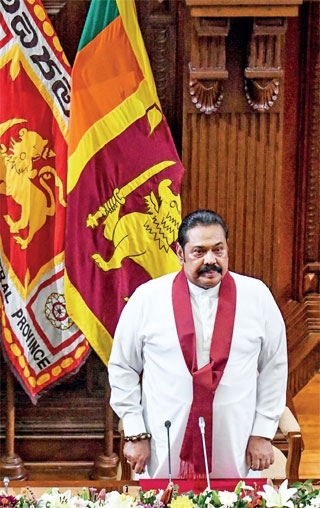Mahinda Rajapaksa, a bankrupt country and 50 years of politics

“You can fool some of the people all of the time, and all of the people some of the time, but you cannot fool all of the people all of the time”
– Abraham Lincoln –
The half a century long political career of Mahinda Rajapaksa has ended in infamy, a fugitive hiding from a people sorely wronged by a political culture of which he was a most visible representation.
During these five decades, Mahinda has held nearly every position a people’s representative could hold: Member of Parliament, Cabinet Minister, President and Leader of Opposition. Generally, an extraordinarily lengthy public career, taken with the many positions occupied, including the Presidency of the country, would point to an exceptional personality. Not so in Sri Lanka apparently. It is his commonness which is celebrated, there is nothing distinguishing him. We look in vain for the exemplar, the visionary or the intellectual in Mahinda Rajapaksa.
What stands out in him is the opposite, the pedestrian, the commonplace, playing to the gallery and the blatant promotion of his own family. However, for those craving patronage, Mahinda provided a ready path. Positions, recognition, avenues to earn money and other trinkets he was generous with (at State expense). There were many who craved these baubles. He had no interest in the moral upliftment or the broad intellectual development of the people. An awakened nation would be to his disadvantage. Now in thrall of the politician, the people’s lowest common denominator was his playground. Mahinda knew what ticks in this society, what a more thoughtful person will find objectionable, he was at ease with. He climbed the greasy pole not on the strength of his character or skill: it was a career built on patience, cunning and posturing.
Even among a gang of thieves, the gang leader must possess some quality that elevates him. There must be an explanation for his emergence. The stamina to nurse his rural constituency for this length of time is perhaps one. Many other political veterans have chosen the easier path of the national list, which our Constitution conveniently allows. Mahinda also had the good fortune to see his career peak at a time when the overall quality of leadership in the country was going downhill.
A leader gets assessed relative to his immediate rivals. Gone were the Dudley Senanayakes, S.W.R.D. Bandaranaikes, J.R. Jayewardenes, N.M. Pereras and the Pieter Kenuemans. Primarily, Mahinda gets compared to his contemporaries like Chandrika Kumaratunga, Ranil Wickremesinghe and Maithripala Sirisena. Chandrika is a two-term president, while Ranil had been prime minister several times now. In most democratic countries, such reappointments would be uncommon, therefore admirable. Not in Sri Lanka, a few names have been appearing and reappearing in high positions from 1948. This recurrence of a handful of persons as leaders of the country only emphasises something everybody knows; an empty society, hopelessly diseased.
It is difficult to see history being kind to either Ranil or Chandrika, perhaps a footnote on what could have been. Given the opportunities continually offered to them both, their impact on this nation’s story is negligible. They may have meant well, but as commonly said, the path to hell is paved with good intentions. On the issue of the northern terrorism, they both got things totally wrong, as events later proved.
The LTTE, formidable as well as ruthless, were terrorising the whole country, holding a substantial part of the land in an iron grip. To take the battle to them was a gamble, weak nations do not always have complete autonomy in such things. Neighbouring countries as well as powerful nations often interfere. A war effort can ruin the economy of a poor country. Once committed, Mahinda did not waver on his stance on the war on the terrorist group.
It was a gamble that paid dividends. In May 2009, after a tough battle, our armed forces triumphed over the implacable LTTE. The LTTE rhetoric was not mere bluster, many of them fought to the last, dying with the gun still in their hands. After nearly three decades of intermittent fighting, peace dawned, the rejoicing was spontaneous.
